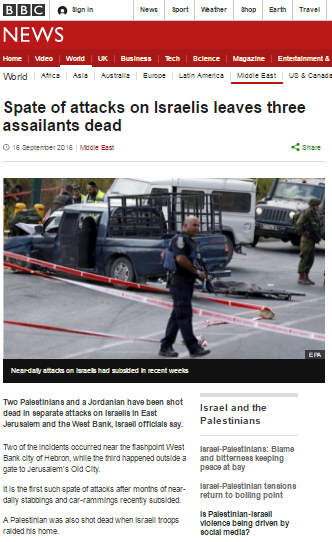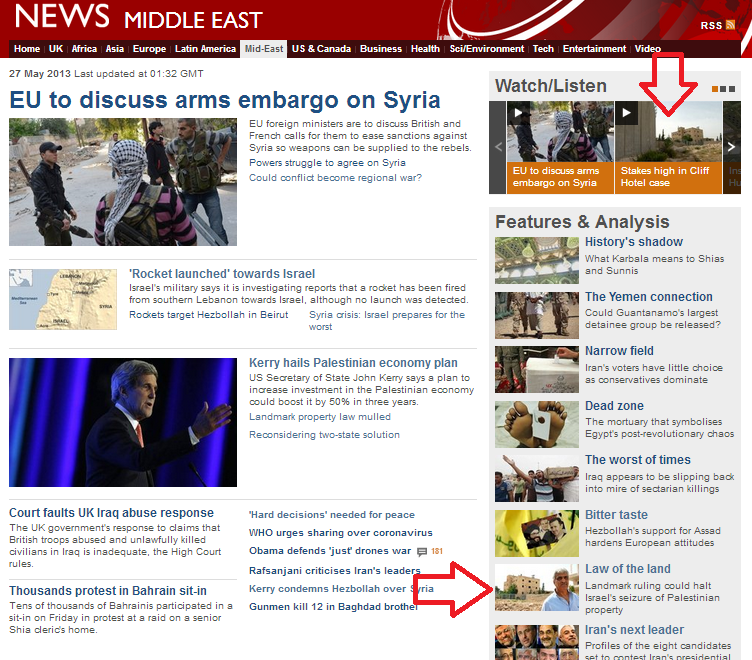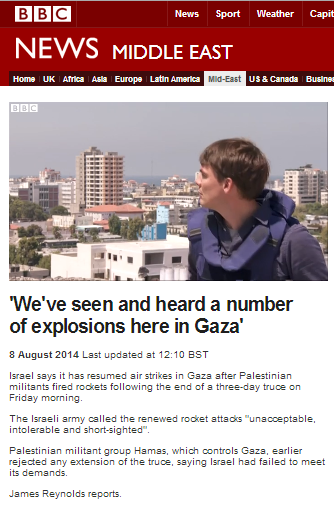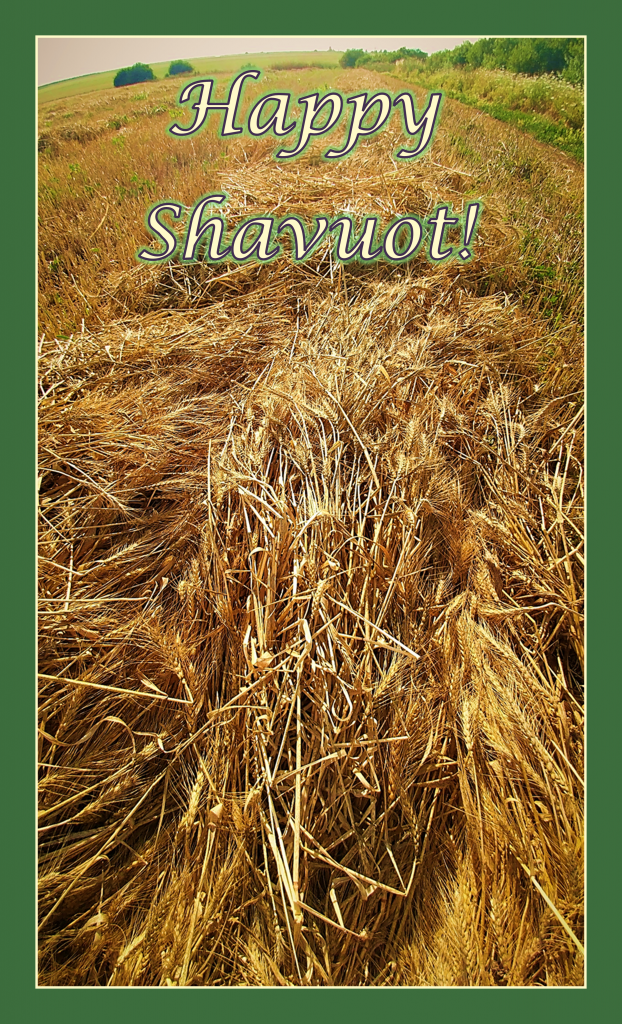On Friday July 21st pre-planned rioting took place in Jerusalem as well as at additional locations after yet another ‘Day of Rage’ had been called by Palestinian leaders. The BBC News website covered the day’s events in two reports – one written and one filmed.
The filmed report by Yolande Knell is titled “Clashes in Bethlehem over holy site” and its synopsis links to the written report, telling viewers that “[i]t follows tension over the place known to Muslims as the Haram al-Sharif, and to Jews as the Temple Mount”.
In the first part of that report Knell describes the Israeli security forces’ response to what she terms “protests”.
Knell: “Now those unusual prayers are turned into protests very quickly. Already there’s been skunk water fired – a very stinky liquid – by the soldiers. They’re using stun grenades and tear gas as well.”
After the caption “How did we get here?” appears on screen, the report then goes on to show footage apparently filmed some time earlier, with Knell telling BBC audiences that:
Knell: “Palestinian worshippers across the West Bank aren’t praying inside their mosques today but they’ve come outside. Here in Bethlehem they’re on the streets, under the hot sun with their prayer mats. And this is a very symbolically important location because just along there, that’s the road to Jerusalem and it’s now blocked by Israel’s separation wall. You can see the Israeli military watchtower that’s just over there.”
Knell refrains from informing viewers that the anti-terrorist fence (which of course has nothing at all to do with the story she is supposedly reporting) had to be constructed because of Palestinian terrorism. Her claim that the road to Jerusalem is “blocked” is misleading: the checkpoint there is open 24 hours a day. She then goes on to uncritically parrot Palestinian messaging.
Knell: “And the Friday sermon has been about the need to protect the al Aqsa mosque and the Dome of the Rock that lies in the same compound. There’s a model of it here. Palestinians see themselves very much as the guardians of these places – the third holiest site in Islam – and emotions are really running very high.”
Knell does not bother to clarify to viewers that there is in fact no need “to protect” the Muslim holy sites on Temple Mount at all before giving an unchallenged platform to an unidentified interviewee who is allowed on camera while wearing a t-shirt with a politicised image that erases Israel.
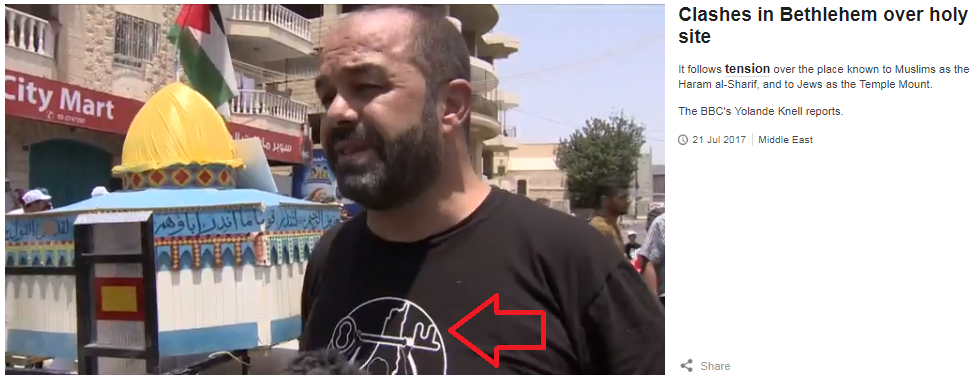
Man: “The Palestinians now took a decision to fight for their capital [sic], for their dignity. All the people who are coming here came to raise their voice. Jerusalem is a red line. We will not allow the occupation to pass this red line.”
Footage seen later in the video suggests that the unnamed man is one of the leaders/organisers of the unrest but seeing as the BBC did not bother to identify him, audiences are of course unable to make their own judgements concerning his “particular viewpoint” – not least the claim that Jerusalem, which is of course subject to final status negotiations, is the Palestinians’ “capital”.
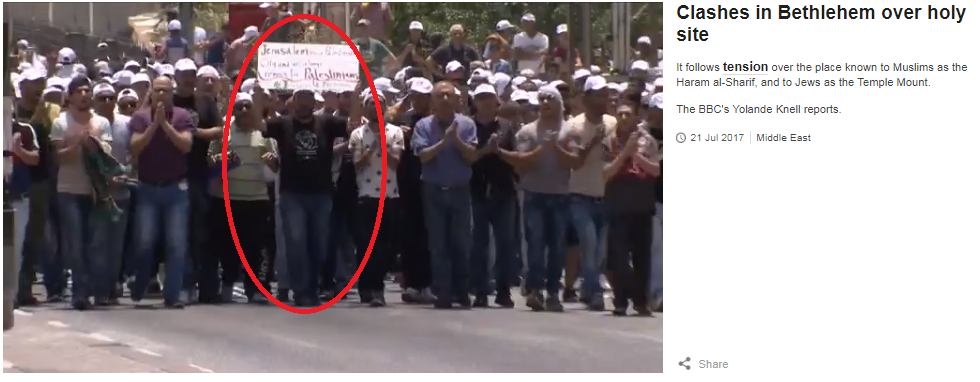
That video was also included in the BBC’s written report on the same events – currently titled “East Jerusalem: Palestinians killed as holy site tensions soar“. The earlier versions of that report correctly informed readers that a ‘Day of Rage’ had been called in advance but that information was removed from subsequent versions.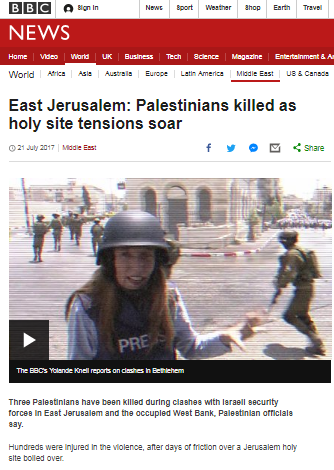
The article explains the background to its subject matter as follows:
“Hundreds were injured in the violence, after days of friction over a Jerusalem holy site boiled over. […]
Tensions have soared since two Israeli policemen were killed a week ago.
Three Israeli Arab gunmen shot the officers near the holy site known to Muslims as Haram al-Sharif and to Jews as the Temple Mount. The gunmen were shot dead after being pursued on to the site.”
And later on in the report readers were told that: [emphasis added]
“In the wake of the killing of the police last Friday, Israel installed metal detectors at entrances to the holy site. The move, however, drew an angry reaction from Palestinian and Islamic leaders who say it is a violation of the status quo. […]
Israel says the measure is necessary for security after the weapons used to kill the policemen were smuggled into the hilltop compound. […]
Israel has repeatedly pledged to maintain the status quo – a delicate set of arrangements in place at the site for the past 50 years. Any changes there are often regarded by Palestinians, who claim East Jerusalem as the capital of a sought-after state, as a violation of these arrangements.”
However, the BBC did not bother to inform its audiences what the status quo entails or that, despite what “Palestinian and Islamic leaders” may say, the installation of security measures after terrorists had weapons delivered to them inside al Aqsa mosque does not violate the existing arrangements which include the following:
“The Waqf, as an arm of the Jordanian Ministry of Sacred Properties, would continue to administer the site and would be responsible for the religious and civil arrangements concerning the Temple Mount.
The Israeli Police would be responsible for security within the holy compound, the interior area and its outskirts, the wall and the gates.”
This is of course not the first time that the BBC has referred to ‘the status quo’ on Temple Mount without properly explaining to audiences what that term actually means.
Additional recent BBC reports also amplified Palestinian messaging without clarification or qualification. An article that appeared on the BBC News website on July 22nd under the headline “Jerusalem: Metal detectors at holy site ‘could be removed’” failed to inform readers that installation of the metal detectors came after firearms were smuggled into al Aqsa mosque.
“Israel installed the detectors after two Israeli policemen were killed near there earlier this month.”
It then unquestioningly amplified baseless Palestinian claims:
“The measures angered the Palestinians, who accuse Israel of trying to take control over a sacred place.”
Another article – published on July 23rd under the title “Jerusalem: Israel installs security cameras near holy site” – also amplified baseless claims while failing to provide readers with the information that would enable them to judge the validity of such allegations.
“But Palestinians strongly object to the installation of metal detectors. They see it as a move by Israel to assert more control over the sacred site and as a violation of longstanding access arrangements.”
The BBC is obliged to “provide impartial news and information to help people understand and engage with the world around them”. The unchallenged amplification of one side’s baseless allegations and the repeated failure to properly explain the issues behind such highly inflammatory subject matter obviously do not meet that obligation.
Related Articles:
BBC backgrounder on Palestinian ‘metal detector’ outrage fails to tell all
BBC’s Connolly fails to tell all about the ‘status quo’ on Temple Mount
BBC coverage of Succot Temple Mount riots – part one
Why the BBC’s failure to cover faux outrage in Jerusalem matters in the UK
More conspiracy theory amplification from BBC’s Yolande Knell – and why it matters

